Newsroom > Web Article
UC San Diego and Calit2 Host India?s Ambassador to the U.S. During Extended San Diego Visit
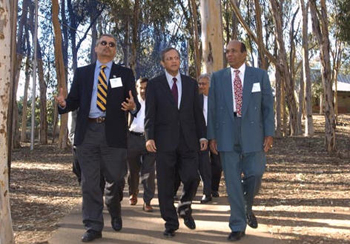 |
| Calit2's Ramesh Rao (left) gives Ambassador Ronen Sen a walking tour of UCSD with San Diego Indian American Society co-founder M.C. Madhavan (right). Later, Sen delivered a public lecture at Calit2. To watch streaming video of the talk and Q&A session, click here [Real player and broadband co nnection required]. Length: 58:45 |
|
San Diego, CA, January 20, 2007 --It was the first extended visit to San Diego of an Indian Ambassador to the United States, and Ronen Sen made the most of his four-day stay. The diplomat visited QUALCOMM and General Atomics; accepted a key to the city from Mayor Jerry Sanders; addressed the World Affairs Council; and met with the editorial board of the San Diego Union-Tribune. But nowhere did Ambassador Sen engage more with his hosts than he did at UC San Diego.
"We want to build more universities and research institutions, but also to have greater interaction between U.S. educational, research and development institutions and their Indian counterparts," said Sen, whose San Diego sojourn was organized by the San Diego Indian American Society (SDIAS). "This is one of my priority areas, so wherever I go, I tend to make a beeline for these centers of excellence."
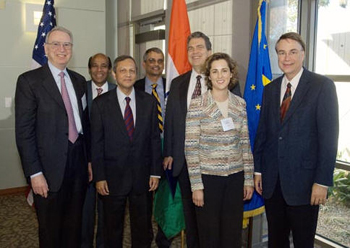 |
| (l-r) Irwin Jacobs; M.C. Madhavan; Amb. Ronen Sen; Calit2's Rao; IR/PS dean Peter Cowhey; economist Jessica Wallack; Calit2 director Larry Smarr. |
|
That he did. In his first 48 hours in San Diego, and despite the Martin Luther King Jr. Day holiday, Sen met with senior officials of the Institute of the Americas, Scripps Institution of Oceanography, Jacobs School of Engineering, and California Institute for Telecommunications and Information Technology (Calit2). He held a private meeting with staff and faculty involved in Calit2's India initiative, attended a luncheon co-hosted by UCSD Chancellor Marye Anne Fox and Calit2 UCSD division director Ramesh Rao, and gave a public lecture in Atkinson Hall.
At the Jan. 16 luncheon, Chancellor Fox called India a "crucial ally" for U.S. universities with strong science and engineering programs - especially if they want to address global issues such as the environment and sustainability. "It is one of the most pressing challenges we face," said Fox. "We must unite our resources in research and education so we can respond to our obligation to understand the complex interconnections that sustain life, and create new products that will not hurt the environment."
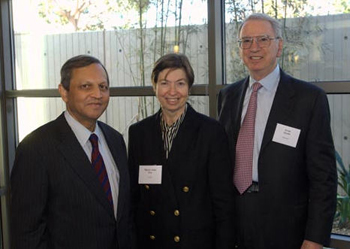 |
| Ambassador Sen with Calit2 luncheon co-host UCSD Chancellor Marye Anne Fox and QUALCOMM chairman Irwin Jacobs. |
|
In welcoming guests to the luncheon, Calit2's Rao recapped highlights of the institute's India initiative: signing a distance-education agreement; meeting with Indian Prime Minister Manmohan Singh and President APJ Abdul Kalam; and organizing the U.S.-India Summit on Education, Research & Technology last May. "What pulls us together is how to use high technology to solve societal problems," explained Rao. "During the summit we had the chance to interact with the Science and Technology Minister, Kapil Sibal, who was here for three days, and his visit made such a substantive impression that he wants to create an institute focused on science and innovation somewhere in India. We have now been formally asked to help them with this process of architecting what this institute in India might look like."
Nuclear issues were high among Amb. Sen's talking points throughout the week, following President Bush's signing in December of legislation that will enable the U.S. to negotiate a permanent civilian nuclear agreement with India for the first time.
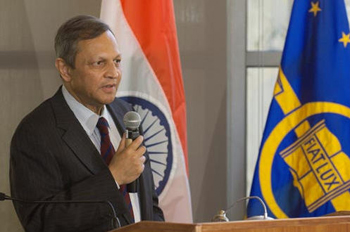 |
| Amb. Ronen Sen participates in an informal dialogue with UCSD experts. |
|
In his public lecture at Calit2, co-sponsored by UCSD's Graduate School of International Relations and Pacific Studies (IR/PS) and the SDIAS as part of the society's quarterly lecture series, Sen called the agreement an "historic landmark" in bilateral relations. "It is a manifestation of an incredibly rapid transformation of the relationship between India and the United States into what can truly be called a strategic partnership," he said. "It will promote energy security, facilitate economic development without adversely affecting the environment, open up new areas of business cooperation, and reflect our shared commitment to nuclear nonproliferation. So there is no downside to this agreement."
He did warn, however, that it's just the beginning. "It is now U.S. law, but the process is not complete," said Sen, who missed the signing ceremony at the White House because he was called back to New Delhi to face harsh questioning in Parliament over the deal. "Now we have enabling legislation, allowing the two governments to negotiate a bilateral nuclear cooperation agreement. Any agreement will be subject to congressional approval, but it won't be debated in Congress -- there will be a straight up-or-down vote. It will have to get the concurrence of the 49-nation Nuclear Supplies Group, which operates on the basis of unanimity, and then there will have to be negotiations between India and the International Atomic Energy Agency (IAEA) on a specific agreement to apply safeguards to India's civilian nuclear facilities."
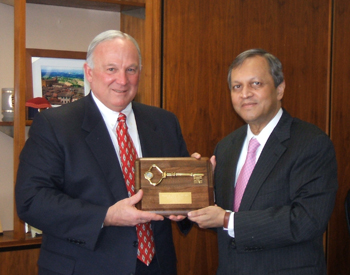 |
| The Indian diplomat accepts the key to the city from Mayor Jerry Sanders. |
|
At the luncheon dialogue moderated by IR/PS dean Peter Cowhey, Sen stressed India's strong record of preventing the spread of nuclear technology or materials from its home-grown nuclear energy program. "Our worst-case national security nightmare is proliferation," said the diplomat. "India is adjacent to the biggest concentration of terrorists in the world, as well as the biggest sources and destinations of nuclear proliferation."
At the same time, he said, nuclear power is the only hope of meeting the Indian economy's booming demand for energy without substantially harming the environment. "We don't want to make a choice between perpetuation of poverty and environmental protection," said Sen, noting that today nuclear power accounts for less than 3 percent of India's energy needs. "Energy is our Achilles' heel. Unlike China, which also has tremendous demand for energy, we are cut off from access to any sources. So we have a vital interest in the stability of China, and in peace and stability in Afghanistan and Pakistan, because without that, we cannot reach sources of oil and gas in central Asia."
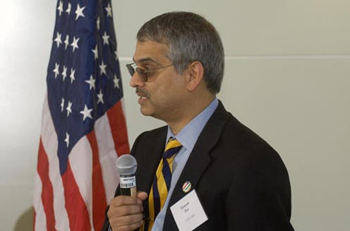 |
| Calit2 division director Ramesh Rao |
|
IR/PS professor Miles Kahler asked the Ambassador about meeting basic needs in a country where 47 percent of children under 5 are malnourished, and the adult illiteracy rate is 61 percent. Sen responded that to invest in education, health care, literacy, nutrition and infrastructure, India cannot afford to divert a large chunk of government funds to pay for the additional 60,000 megawatts of nuclear power that are needed. "I am asked why we talk to the U.S. about it or seek international approval for our nuclear power program," explained Sen. "Well, with scarce public funds, we should invest in areas where the private sector will not invest. Nuclear power reactors are expensive, yet very profitable in the long run. But investors want longer-term assurances and this agreement will inspire investor confidence."
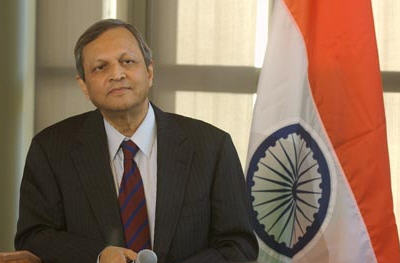 |
| Indian Ambassador to the U.S. Ronen Sen |
|
He went on to describe other areas where the U.S. and India have signed cooperation agreements in the past two years, including: civilian space launch facilities, dual-use technologies, missile defense, biotechnology, nanotechnology, and private investment, which is increasingly going in both directions, as is trade. "If you take trade in both services and goods, it was $40 billion last year, and growing at a rate where it can be expected to double every three years or so," said Sen, noting that "it will grow in both directions."
Later, the Ambassador was honored at a dinner organized by the San Diego Indian American Society. In his speech, Sen emphasized the contribution of Indian Americans both "to their country of choice and their country of birth." He also recognized the positive role played by the Indian-American community in strengthening and bringing the two countries closer together.
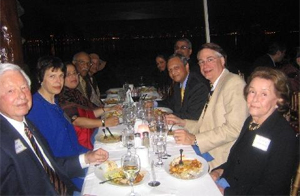 |
| SDIAS dinner (front six, l-r): James Haugh, Janet Smarr, Kalpana Sen, Ronen Sen, Calit2 director Larry Smarr, and philanthropist Lucy Haugh. |
|
The dinner was hosted by SDIAS co-founder M.C. Madhavan and catered by India Princess restaurant. "Ambassador Sen is the first Indian Ambassador in the last 40 years who has spent this amount of time in San Diego," observed Madhavan, a professor of Economics and Asian Studies at San Diego State University. "He met with intellectuals, industrialists and students from India and the U.S., and left San Diego with more people of many persuasions appreciating India and its contributions to tackling global issues."
Also on Sen's itinerary in San Diego: a speech to the World Affairs Council on U.S.-India relations; a meeting with over 400 Indian students enrolled at SDSU - the largest contingent from India in the San Diego area; and a meeting organized by Salk Institute dean of faculty Inder Verma with biotech academics and venture capitalists of Indian origin.
Sen is a career diplomat, and he has held the country's most important diplomatic posts: High Commissioner to the United Kingdom, Ambassador to the Russian Federation, to Germany, to Mexico, and to the United States, since August 2004.








